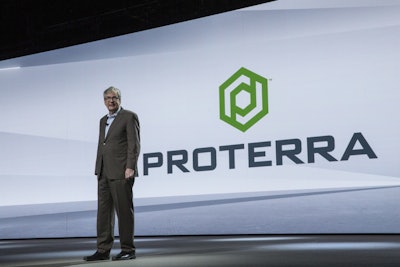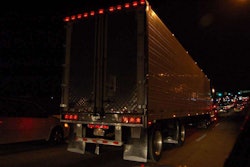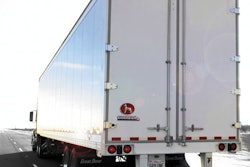 Martin Daum, head of Daimler Trucks & Buses, announces an investment in Proterra, a California-based maker of zero-emissions buses.
Martin Daum, head of Daimler Trucks & Buses, announces an investment in Proterra, a California-based maker of zero-emissions buses.Automation was the overarching theme at IAA 2014, while connectivity and electric vehicles stole the show two years later. At IAA 2018, the world’s largest commercial vehicle show in Hannover, Germany, the theme was evolutionary rather than revolutionary as OEMs and suppliers announced production models (at least in Europe) that showcase much of what they promised in the last four years.
Mercedes-Benz’ new Actros is a prime example, a ready-for-order cabover that boasts SAE Level 2 autonomous capability with its Active Drive Assist platform. The technology isn’t just for Europe, either. While Daimler’s ADA system will first be rolled out there, “We will be providing it to Freightliner and Fuso as well,” said Martin Daum, head of Daimler Trucks & Buses during a press conference at the trade show.
Daimler also announced another major development for its electric drivetrain development, investing $155 million in Proterra, a California-based manufacturer of zero-emissions local transport buses. The company’s configurable Catalyst platform is capable of serving the full daily mileage needs for most transit routes on a single charge.
“We started working on electric trucks and buses at a very early stage and we aim to set the standards here in each relevant segment,” said Daum. “We expect the cooperation with Proterra to deliver additional impetus for the development of heavy-duty commercial vehicles with electric drive. In this way, we are broadening our scope in particular concerning the key technology of the battery – also with regard to North America.”
Within the last two years, Daimler has launched a number of electric-driven vehicle initiatives across a wide variety of North American vehicle segments, including the Fuso eCanter, Thomas Built Buses Jouley and Freightliner eCascadia and eM2.
Daum said the challenge remains finding the right electric solution for each business use case. “The required range depends on the routes a truck or bus travels on, and the opportunities of when and where to charge vary from customer to customer,” said Daum. “This results in a host of requirements and that takes time to meet those, but I think we are doing well on these counts.”
Tariffs and trade
As a leading global manufacturer, Daimler Trucks & Buses and its Daimler Trucks North America subsidiary historically have been tight-lipped in recent years when asked about to comment on the renegotiation of U.S. trade policy with its North American partners, recent tariff hikes and trade posturing worldwide.
During a roundtable with the North American press prior to the press conference, Daum expanded on the company’s statement that it remains a proponent of open borders and free trade.
“Whoever separates itself from the global markets ultimately suffers the most,” said Daum. “You get a bigger share but fewer patrons. A bigger share of a smaller cake might be less than a smaller share of a much larger cake.”
Corporations like Daimler with operations in all corners of the globe are more susceptible to the threat of higher tariffs.
“Global for us means we are strongly embedded in the local economies that we serve, whether it’s China, Japan, India, Europe, Brazil or North America,” said Daum. “We employ thousands of people and invest hundreds of millions of dollars in each market. But on the other side it benefits when we ship [product] around the globe… If this global exchange of ideas, people and goods gets interrupted, then everyone would suffer. A trade war at the end of the day will have no winner, just losers.”
“Not rejoicing” on North American CV market
With production slots for North American customers sold out through the middle of 2019, Daum said market conditions should remain strong in the near term but warns of the potential for market volatility whenever the current cycle ends.
“The sentiment of our customers is strong, commercial freight is high, freight rates continue to be high,” said Daum, who headed DTNA from 2009 to 2017 prior to his current post. “I think the markets are, from my internal U.S. compass, a bit too high. In years when the market is too high it could foreshadow a valley that could be deeper. I’m not full of rejoicing over that market.”
In addition to current order inflation, Daum added a potential trade war and higher interest rates for equipment financing as threats to curb the current truck market in North America.











